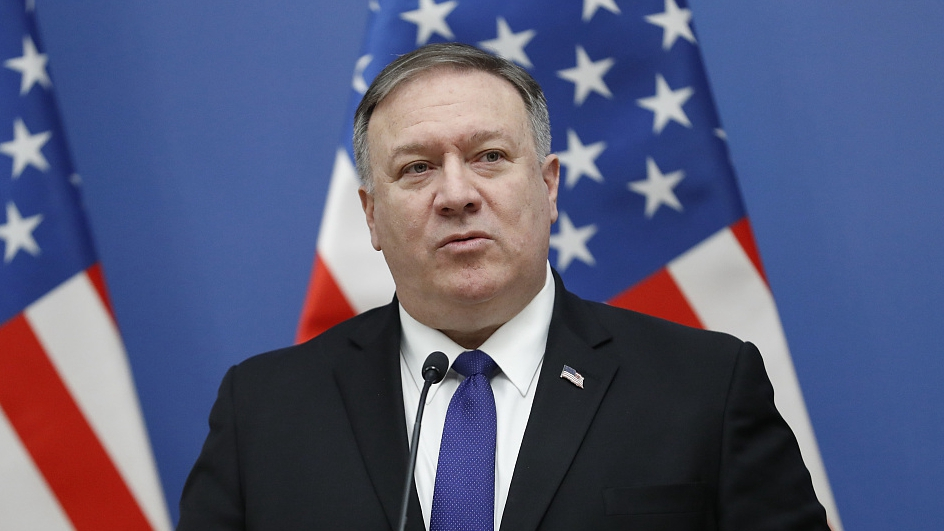
Editor's note: Tom Fowdy is a British political and international relations analyst and a graduate of Durham and Oxford universities. He writes on topics pertaining to China, the DPRK, Britain and the U.S. The article reflects the author's opinions, and not necessarily the views of CGTN.
On July 23, U.S. Secretary of State Mike Pompeo held an anticipated speech on China at the Richard Nixon Presidential Library in Yorba Linda, California. The speech's location was no coincidence, for Pompeo wanted to calibrate the message that about 50 years of "engagement" with Beijing, having been commenced by Richard Nixon with his visit to China in 1972, was a failure.
"What do the American people have to show now 50 years on from engagement with China?" he asked, before indulging himself in a gluttonous feast of Cold War clichés which sought to portray China as being on a quest for world domination and at America's own expense. Despite claiming that he stands with the Chinese as "freedom loving people" he proceeded in the same speech to denounce them as spies, infiltrators and intellectual property thieves within the U.S.
Pompeo's speech regurgitates tedious clichés. At the heart of it all, as set out by him, is a problematic assumption that the U.S. has a divine right and mission to "transform" China towards its own vision, and that any positive policy of engagement, as he argued Nixon did, was purely conditional upon this premise than the common good.
Therefore, he argued, this legacy was a failure, produced nothing for America's gain and thus the U.S. must act in order to try and "change" China by forceful means, placing emphasis on the rhetoric of zero-sum ideological struggle against "Marxism" and saying effectively arguing that the two countries systems cannot co-exist.
Is engagement with China really such an absolute failure? Is it true that the two countries cannot cooperate with everything and that good faith actions are at America's expense? Much of Pompeo's rhetoric was domestic orientated in tone, arguing that engagement had cost the U.S. millions of jobs and billions of dollars.
This of course is not true. Economics is never "zero-sum" or "win-lose." The idea that the American economy has somehow lost growth and jobs in trade, investment and cooperation with China is not supported by any serious study.
Instead, China has invested in the past 50 years a total of 150 billion U.S. dollars in the U.S. In its own markets, it has given American firms profound levels of success by granting them larger numbers of customers than was ever possible at home. Ford Motors total revenue in China has stood at eight billion U.S. dollars.
Chinese manufacturing has lowered inflation, made goods affordable, students have equally poured billions into American universities and the economy, providing some of their institutions with some of the brightest and most brilliant minds in the world, of which China itself would love to keep. Similarly excessive propaganda and vilification over things such as "intellectual property theft" ignore how crucial scientific cooperation and research ties have not been zero-sum, but to the gain of both countries.

Krimson Klover's CEO and founder Rhonda Swenson shows a jacket made in China, in Boulder, Colorado, the U.S., September 12, 2019. /Xinhua
Krimson Klover's CEO and founder Rhonda Swenson shows a jacket made in China, in Boulder, Colorado, the U.S., September 12, 2019. /Xinhua
Beyond this, the idea that China-U.S. relations have failed to benefit the broader world is also false. As two of the world's largest powers, Washington and Beijing have utilized their scope in order to address many global issues and find common ground for a cause of peace, stability and progress.
The two countries ought to cooperate on climate change, on nuclear non-proliferation, on global economic stability and prosperity, peacekeeping, conflict resolution and many more things. To claim all this effort has been a failure, and has done nothing for America or for that matter the world, is gravely misleading. Talks of China pursuing hegemony are also untrue.
Yet, Mike Pompeo does not adhere to the facts, he claims to be righteous yet is vehemently dishonest is clouded by a zero-sum, ideological crusader like vision that he is somehow a savior of China. The idea that he can somehow claim more representation for China's people, than the government of China itself, whilst demonizing every human aspect of the bilateral relationship as being a malign Communist conspiracy, is inherently contradictory and seedy.
His repeated parallels to the Soviet Union illustrate his dangerous vision for the world, and the mindset which he reflects, the administration has effectively decided it is in a Cold War.
But one thing is for sure, the path which Pompeo offers is fundamentally misleading the American public. It presents the tempting allure of a time gone by and seeks to push back against the wind of change and the tide of history. The path he presents will not lead America to prosperity, it will not make America safe and it will not make America great again.
Instead, it risks creating a divided, isolated, uncertain and fractured world, burning bridges and building walls. This is not a choice between liberty and tyranny, it is the expression of fanaticism and insecurity by a country that cannot envision nor tolerate a world which it cannot absolutely and indisputably dominate.
(If you want to contribute and have specific expertise, please contact us at opinions@cgtn.com.)